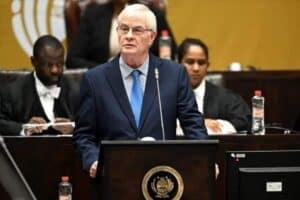Malatsi’s proposed telecom reforms and BEE changes draw ANC and GNU criticism, highlighting cracks in coalition politics.

With Communications and Digital Technologies Minister Solly Malatsi yesterday having sparked unease within the ANC in the government of national unity (GNU) over proposed black economic empowerment reforms in the telecommunications sector, experts warn of the lack of consensus politics in the GNU.
This is set to derail the future smooth workings of the multiparty coalition, they said.
Malatsi endured a barrage of criticism from MPs during a briefing before the parliamentary portfolio committee on communications and digital technology for his decision allowing companies to contribute to South Africa differently than the 30% local ownership required by law.
Minister Malatsi criticised by MPs
He said the proposal was not driven by a desire to help US tech billionaire Elon Musk’s Starlink. Malatsi said he wanted to increase competition in the sector – lowering prices.
While transformation was a non-negotiable government policy, there had to be a choice to encourage economic growth.
ALSO READ: Makhubele shoots down Starlink as ‘frivolous’ while Malatsi champions space for competition
“We are not attempting to open a special dispensation for Starlink. Transformation is sacrosanct and non-negotiable.
“Regulations must consistently make way for two choices when it comes to the role of multinationals,” he said.
Independent political analyst Sandile Swana said the multiparty national interest document compelled GNU members to “first bring on board all the major parties in the GNU to understand where national interest lies – taking into account that communications is a very security-sensitive segment in any nation”.
Minister should built consensus in parliamant and GNU
“Malatsi should have built consensus in parliament and in the GNU on the new policy shift in the telecommunications sector.
“Even if you are a DA or ANC member, the new South African governance politics compels you to build good relationships and connections in the uMkhonto weSizwe, DA, ANC, EFF, Freedom Front Plus, Patriotic Alliance, African Christian Democratic Party and other parties to bring people to consensus.
ALSO READ: Solly Malatsi’s B-BBEE proposals are nothing new
“As a member of Brics, the African Renaissance and New Partnership for Africa’s Development, we should realise that we are not a satellite or an enclave of the West – as the DA wants us to be.”
Policy analyst Nkosikhulule Nyembezi said the country’s democracy mirrored “a triumph of consensus politics”.
“Despite this, political dynamics in the GNU often mean decisions on crucial national questions have had to be put off for fear of shattering alliances.
Democracy mirrors ‘triumph of consensus politics’
“This leads to political and policy uncertainty, particularly after the talk about the national dialogue – unfunded in this budget.
“By huddling closer together while overlooking the national dialogue, elected representatives appear to be encouraging the political instability they wanted to avoid,” said Nyembezi.
ALSO READ: Proposed Starlink deal ‘wrong in principle and practice’
“Arguments which broke out ahead of this third budget speech could still linger to delay the passing of the departmental budget votes and various policy proposals in the coming weeks.”
Political expert Daniel Silke, said there was “nothing new in the DA and the ANC substantially differing in policy preferences on empowerment”.
But the DA and the ANC were “expected to compromise on new policy directions”.
DA and ANC must compromise
He said the ANC had dealt with a double whammy: internal DA and external White House pressures “to adapt some of the old thinking on empowerment”.
“While the DA agrees with adjusting empowerment thresholds and quotas, the ANC faces lack of control within the GNU. Against this background, the GNU has been fraught with difficulties.
ALSO READ: MK party threatens Malatsi with court action if Starlink gazette not scrapped
“The ANC has been unable to take new directions when it comes to former party policies based on ideology, rather than practicality.
“The issue of the telecommunications reforms is a test for the ANC – to see whether the party is prepared to bend.
“Reforms are good for business and investment into the country.
Reforms good for business, investment
“Of course, this gives in to the DA wishes and to a degree the wishes of the White House.
“This places the ANC in a position where it can no longer give clarity on policy direction, with the country no longer able to continue with old and discredited policies.”
NOW READ: Malatsi’s move ‘a shameless sellout to American oligarchs Musk and Trump’






